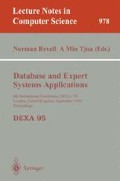Abstract
In this paper, we address, some database problems that a knowledge discovery system deals with. In databases, data may be noisy (uncertain), sparse and redundant. To solve these problems, we describe two methods: The first one is the rule intensity measurement which is an index that answers the question ‘What is the probability of having a rule between two propositions or two conjunctions of propositions ?’ The intensity of rule enables us to measure the probability of an implication of the form: IF premise THEN Conclusion. This index seems to be adapted to the field of Knowledge Discovery in Databases (KDD). It resists noise, converges with the size of the sample, eliminates coarse rules, and can be used within the framework of an incremental algorithm. We will analyse it in detail, and compare it with others. The second one eliminates the redundant rules and superfluous propositions by using an algorithm for finding a minimal set of rules.
Preview
Unable to display preview. Download preview PDF.
References
R. Agrawal, T. Imielinski, and Arun Swami. “Database mining: A performance perspective”, IEEE Trans. Knowl. Data Eng., vol 5, n 6, 1993.
T. M. Anwar, H. W. Beck, S. B. Navathe. “Knowledge Mining by Imprecise Querying: A Classification-Based Approach, “IEEE 8 th Int. Conf. on Data Eng. Phoenix, Arizona, Feb. 1992.
Atkins J. “A note of minimal covers”, SIGMOD Record, Volume 17, Nℴ4, December 1988, pages 16–21.
Ho Tu Bao, Tong Thi Thanh Huyen, “A method for generating rules from examples and its application”, Symbolic Numeric Data Analysis And Learning, p 493–504, Nova Sciences Publishers 1991.
Briand H., Crampes J. B., Hebrail Y., Herin-Aime D., Kouloumdjan, Sabatier R., “Les systèmes d'Information”, DUNOD edition, 1986.
Clark P., Niblett T. “The NC2 induction algorithm. Machine Learning”, 3. p 261–283 1988.
Cendrowska J. “An Algorithm for inducing modular rules”, Int J. Man-Machine Studies, p 349–370, 1987.
Date C. J., “An introduction to database systems”, Volume1, Fifth edition.
Diday E. Mennessier M.O. “Analyse symbolique pour la prévision de séries chronologiques pseudo-périodiques”. Induction symbolique et numérique à partir de données, p 179–192,Cépaduès-éditions, 91.
Frawley W. J., Piatetsky-Shapiro, C. J. Matheus, “Knowledge discovery in databases: an overview”, in Knowledge Dicovery in Databases. Cambridge, MA: AAAI/MIT, 1991, pages 1–27.
Ganascia J. G., “CHARADE: A rule system learning intelligence”, IJCAI, Milan, Italy, Août 1988.
R. M. Goodman, P. Smyth, “The induction of probabilistic rules set — the rule algorithm”, Proceedings of the sixth international workshop on machine learning, Splatz B. ed., p 129–132, San Mateo, CA Morgan Kaufmann 1989.
Gras R., Larher A. “L'implication statistique, une nouvelle méthode d'analyse de données”, Mathématiques, informatique et Sciences Humaines nℴ120.
Kodrattof Y., Tecuci G., “Techniques of design and DISCIPLE learning apprentice”, Knowledge acquisition and learning, Kaufmann edition, pages 655–668, 1993.
C. J. Matheus, P. K. Chan, G. Piatersky-Shapiro, “Systems for Knowledge Discovery in Databases”, IEEE Trans. Knowl. Data Eng., vol 5, n 6, 1993.
Nummenmaa J., Thanisch P., “Yet of Another on Minimal Covers”, Sigmod Record, Volume 19, Nℴ3, September 1990, pages 30.
G. Piatetsky-Shapiro, ed. Special issue on: “Knowledge Discovery in Data and Knowledge Bases”, Int. J. Intell. Syst. vol. 7, nℴ 7, 1992.
J. R. Quinlan,“Generating Production Rules from Decisions Trees”. The 10 th International Conference on Artificial Intelligence, p 304–307, 1987.
Ullman J. D., “Principles of databases and knowledge base systems, Volume 1, Computer Science press, 1989.
M. Sebag, M. Schoenauer, “Un réseau de règles d'apprentissage”, Induction symbolique et numérique à partir de données, p 241–255, Cépaduès-éditions, 91.
Author information
Authors and Affiliations
Editor information
Rights and permissions
Copyright information
© 1995 Springer-Verlag Berlin Heidelberg
About this paper
Cite this paper
Fleury, L., Djeraba, C., Briand, H., Philippe, J. (1995). Rule evaluations in a KDD system. In: Revell, N., Tjoa, A.M. (eds) Database and Expert Systems Applications. DEXA 1995. Lecture Notes in Computer Science, vol 978. Springer, Berlin, Heidelberg. https://doi.org/10.1007/BFb0049138
Download citation
DOI: https://doi.org/10.1007/BFb0049138
Published:
Publisher Name: Springer, Berlin, Heidelberg
Print ISBN: 978-3-540-60303-0
Online ISBN: 978-3-540-44790-0
eBook Packages: Springer Book Archive

